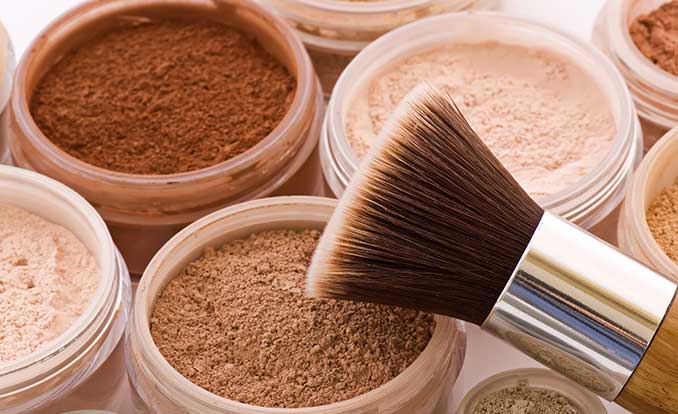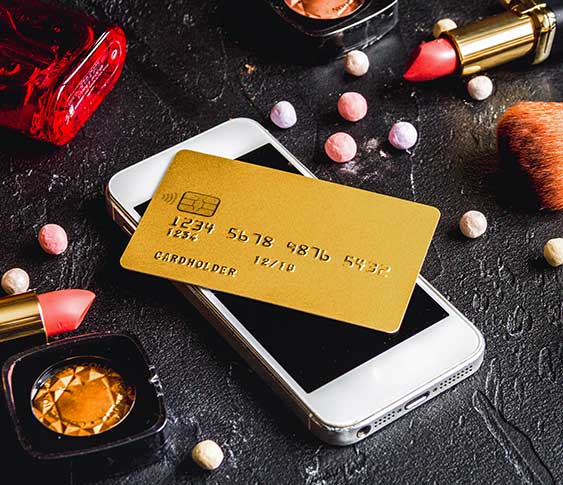
 Cosmetic Merchant Account
Cosmetic Merchant AccountThere are some fine lines that influence cosmetic companies—in more ways than one. Stay informed about regulations and beautify your business with a merchant account from BankCard USA.
Skin care products take up the lion’s share of the cosmetic industry, closely followed by makeup, perfume, toiletries like deodorants, hair color and styling products, and oral cosmetics. According to Statista, the U.S. cosmetic and personal care market’s revenue totaled $70818.43 million in 2017, and it’s projected to rise.
With a noticeable shift toward clean beauty products, customers are leaning toward natural ingredients and the absence of certain additives. Another trend is ecommerce becoming a more popular distribution channel. The cosmetic industry, particularly makeup, is unique because it remains relatively stable despite changes in the economy and customers’ disposable income. The demand for makeup and beauty products is nearly as consistent as it is for need-based products.

If you’ve just launched a skin care line or are interested in exploring your credit card processing options for an existing business, establishing a cost-effective merchant account often takes some research. Some merchant service providers don’t accept high risk businesses, particularly those that are regulatory risk heavy like cosmetic lines. But there are still plenty of high risk providers who will.
Your deciding factors should come down to the provider’s quality of products and services, their transparency, and the transaction rates and fees they charge. Adjusting your business model to become less vulnerable to chargebacks can lighten your transaction rates. Reasons for cosmetic business chargebacks include:
If the business experiences fraud, excessive chargebacks or bankruptcy and is unable to cover financial setbacks, the payment liability falls onto the merchant service provider (MSP). MSPs tend to charge higher rates to create a cushion to absorb financial loss, should it occur, allowing them to pay back banks and credit card companies if the business can’t without taking too much of a financial hit themselves.
BankCard USA works closely with our merchants to ensure they’ve established a lucrative, chargeback-shielded business model. That includes a clearly worded return policy, openly displayed terms and conditions (especially if you offer free trials or recurring billing), fraud fighting tools and more. Our PCI compliance team is here to walk you through the necessary security requirements to protect your business, and we also offer free vulnerability scanning for ecommerce and IP-connected terminal businesses to make sure their internet connection is safe from advanced online fraud attempts.
We assist with payment gateway integration support, so your customers can seamlessly check out on your website. Our mission is to provide you with the most powerful, yet affordable, payment solution. With a cosmetic merchant account from BankCard USA, you have options to customize the capabilities and features you want for your unique business:

Our priorities for your business are maximizing your profits, helping you grow a loyal customer base, building a credible brand and achieving long-term viability in the competitive industry.
Selling cosmetics can be complicated due to U.S. Food and Drug Administration (FDA) regulations. There’s a fine distinction between skin and hair care products that are considered cosmetics and those that fall into the FDA’s classification of drugs and medical devices. It comes down to their intended use.

This is where advertising becomes extremely important. Here’s an example: If your skin product claims to hide the appearance of wrinkles, it’s considered a cosmetic. Cosmetics don’t require FDA approval (with the exception of certain color additives that go in them), but they are FDA regulated. They must not have deceptive labeling or packaging, and it’s the merchant’s legal responsibility to ensure they’re safe for their intended use. There’s also a list of FDA prohibited ingredients that aren’t allowed to go in them.
The FDA usually doesn’t get involved unless a red flag is brought to their attention, such as a customer suffering adverse effects from a toxic ingredient in the product, so the cosmetic industry has a more self-regulated feel.
If your product claims to stop or even reverse wrinkles (“anti-aging”), it’s considered a drug and must be FDA-approved for safety and effectiveness before sold. Antibacterial soaps, sunscreens, acne treatments and other products made for specific treatments, preventative or not, are examples of skin care products that are considered drugs, rather than cosmetics, by the FDA. The gray area grows wider since many products are considered both cosmetics and drugs, and must meet the FDA requirements for both categories. For example:
If you’re launching a skin care line, consult www.fda.gov to determine your products’ classification and set of requirements. Our underwriting team is available to answer any questions you have about categorization and best practices for your specific product.
We also offer credit card processing services for beauticians and salons.